You can preserve food naturally using common kitchen spices and herbs that pack antimicrobial power. Start with classic combinations like cinnamon, cloves, and mustard seeds for general preservation, or try thyme and rosemary specifically for meat. For pickling, toast aromatic spices like bay leaves and coriander before adding them to your brine. Salt remains one of the most effective preservatives, while proper drying of herbs guarantees long-lasting flavor and preservation benefits. When you combine these methods – like salt-curing with spice blends – you'll create even more effective preservation techniques. Discover how these time-tested methods can transform your food storage approach.
Traditional Spice Blends for Preservation
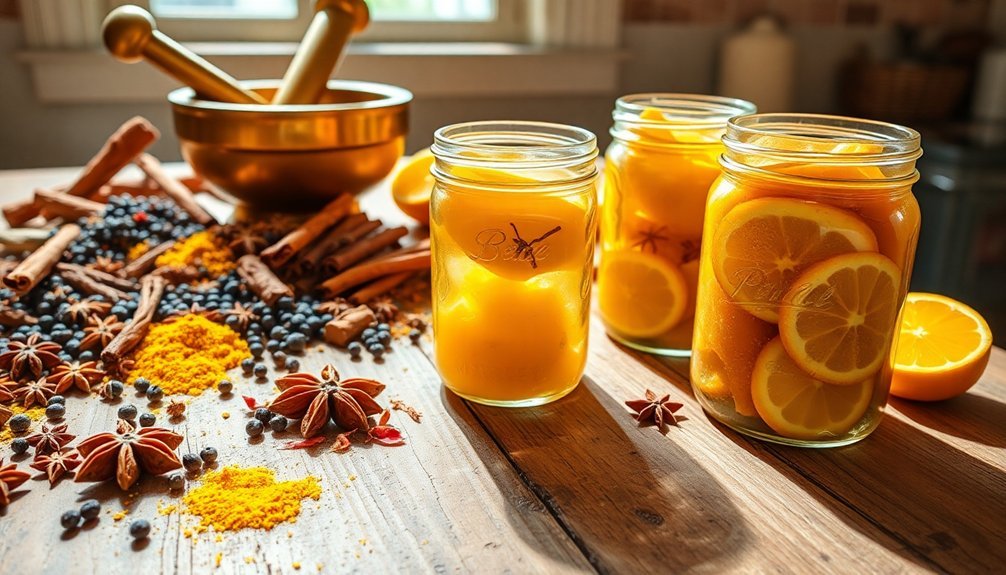
While modern refrigeration has revolutionized food storage, traditional spice blends have preserved foods for centuries through their natural antimicrobial properties. You'll find these preservation techniques deeply rooted in Southern cuisine, where European colonists, West African traditions, and Caribbean influences merged to create effective spice combinations. Black pepper and salt were among the first preservatives introduced by European settlers to the Southern region.
When you're looking to preserve food naturally, you'll want to focus on powerful antimicrobial spices like cinnamon, cloves, and mustard seeds. These spices don't just add flavor; they actively fight harmful bacteria like E. coli and Salmonella. You can combine them with other preservative spices such as oregano and ginger to create more thorough protection for your foods.
To get the most preservation power from your spices, you'll need to blend them strategically. Consider using cumin, coriander, and cinnamon together in stews and gumbos, as these combinations offer both preservative benefits and complex flavors.
You can also apply these spice blends to pickled vegetables and cured meats. The antioxidants in these spices will help prevent fat oxidation while their aromatic compounds mask any developing off-flavors, effectively extending your food's shelf life.
Salt and Pepper Storage Methods
Beyond traditional spice blends, two of history's most fundamental preservatives – salt and pepper – offer remarkably effective storage solutions. You'll find that salt works by drawing moisture from food cells, creating an environment where harmful bacteria can't thrive. With proper salt preservation, you can extend your food's shelf life for months or even years. Before modern refrigeration, people relied on salt preservation methods to keep their food edible.
| Method | Main Ingredients | Storage Duration |
|---|---|---|
| Salt Preservation | Kosher/sea salt, containers | 6-12 months |
| Pepper Roasting | Peppers, olive oil | Up to 1 year |
| Salt Brining | Salt, water, spices | 6+ months |
| Oil-Packed Peppers | Peppers, oil, vinegar | 8-12 months |
When preserving with salt, you'll need to apply it liberally to your food items and pack them tightly in clean containers. For peppers, you've got multiple options – from roasting them to creating a salt-vinegar brine solution. You'll want to store your preserved items in airtight containers in a cool, dark place or refrigerator. Remember to check regularly for proper coverage in brine or oil, and always rinse salt-preserved foods before consuming them.
Pickling With Aromatic Spices
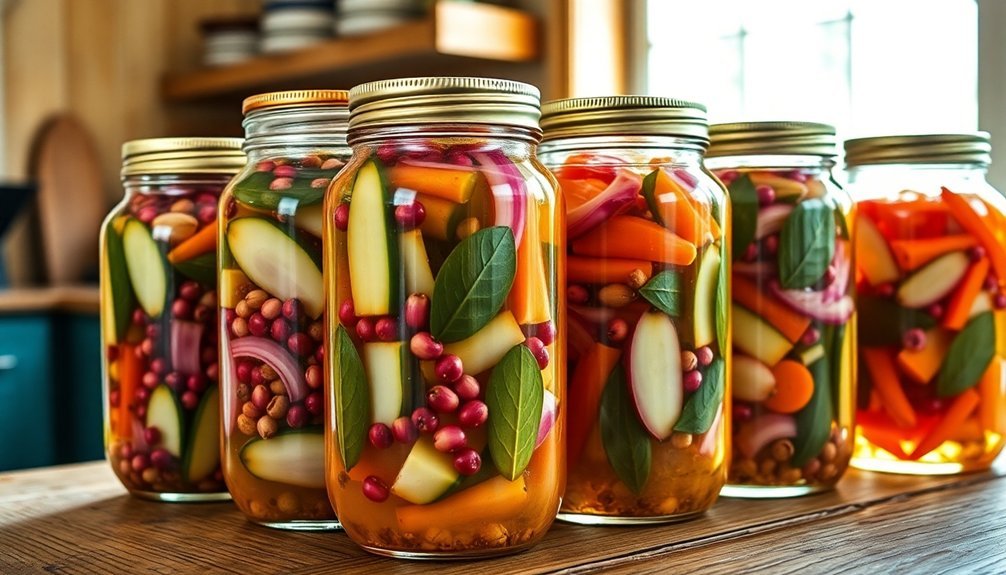
A robust blend of aromatic spices transforms ordinary vegetables into flavorful, long-lasting preserves through the art of pickling. You'll need essential ingredients like mustard seeds, bay leaves, coriander seeds, peppercorns, allspice berries, and red chili flakes as your base blend.
For a personalized touch, you can incorporate additional spices like dill seeds, cinnamon, cloves, or star anise. Common vegetables for pickling include cucumbers, beets, carrots, and asparagus.
To maximize flavor, you'll want to roast your spices in a dry pan over low heat before combining them. Once mixed, store your blend in an airtight container until you're ready to create your pickling brine.
When making the brine, combine equal parts vinegar and water, add salt, and incorporate your spice blend.
- Toast spices before mixing to release essential oils and enhance their preservation properties
- Maintain a consistent 1:1 ratio of vinegar to water for reliable fermentation
- Use 2-3 tablespoons of pickling spice per batch to guarantee proper flavor distribution
- Allow pickles to mature for 1-3 days before eating to develop complex flavors
Your homemade pickling spice blend will keep vegetables fresh while infusing them with aromatic flavors that improve with time.
Drying Herbs and Spices
Preserving fresh herbs and spices through drying offers another powerful method to enhance your food's longevity and flavor.
You'll want to harvest your herbs in the morning after the dew has evaporated to capture maximum flavor, then rinse and pat them dry thoroughly before beginning the preservation process.
You've got three main drying methods to choose from.
Air drying works best for herbs like rosemary, thyme, and oregano – simply tie them in small bundles and hang them upside down in a dark, well-ventilated space for about two weeks.
If you're in a hurry, you can use your oven by spreading herbs on a cookie sheet and drying them at the lowest temperature setting, leaving the door slightly ajar for circulation.
For the quickest results, try microwave drying.
Place herbs between paper towels and heat in 30-second intervals, replacing towels when they become moist.
This method's particularly effective for parsley, mint, and tarragon.
Whichever method you choose, you'll know your herbs are ready when they're crisp and break easily.
Store them in airtight containers in a cool, dry place, keeping strong-flavored herbs separate to prevent flavor transfer.
Spices for Meat Preservation
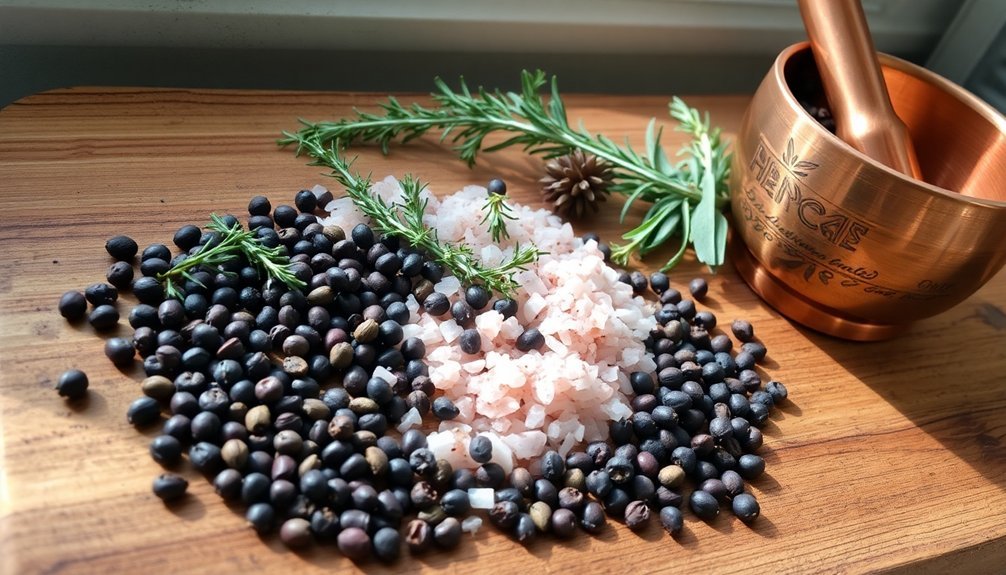
Throughout human history, spices have proven invaluable for extending the shelf life of meat products while enhancing their flavor profiles. You'll find that certain spices work exceptionally well for meat preservation, with thyme and rosemary leading the pack.
Thyme can extend meat's shelf life up to 60 days, while rosemary keeps it fresh for up to 28 days.
When you're looking to preserve meat naturally, you'll get the best results by combining multiple spices. For instance, pairing clove with cinnamon can keep meat fresh for up to 24 days, while creating an environment that's hostile to harmful microorganisms.
- Use thyme and rosemary together for maximum effectiveness – they work better as a team than individually
- Combine ginger with thyme and marjoram for a preservation period of up to 21 days
- Add cinnamon and clove to create an antimicrobial environment that fights spoilage
- Include black pepper and coriander to inhibit bacterial growth
These natural preservation methods don't just extend shelf life – they're also safer than synthetic preservatives.
You'll maintain the meat's original texture and flavor while ensuring it stays fresh longer, all without introducing artificial chemicals into your food.
Frequently Asked Questions
Can Spices Lose Their Preservation Properties if Mixed With Certain Ingredients?
Yes, your spices can lose their preservation power when you mix them with high-moisture foods, oils, or acidic ingredients. They'll also become less effective if you don't maintain proper concentrations in your mixtures.
How Do Different Climates Affect the Preservation Power of Spices?
You'll find that tropical climates weaken spices' preservation power through high humidity, while temperate climates help maintain it better. Climate change affects both, making it harder to predict spice effectiveness in preservation.
Which Spices Should Never Be Combined for Food Preservation?
You shouldn't combine spices with opposing antimicrobial properties, like garlic with saffron, or turmeric with mint. These combinations can reduce their preservation effectiveness and potentially create harmful interactions in food storage.
Are Organic Spices More Effective at Preserving Food Than Conventional Ones?
No, organic spices aren't more effective at preservation than conventional ones. They both have similar antimicrobial and antioxidant properties. You'll get equivalent preservative benefits, though organic spices may contain fewer chemical residues.
Do Electromagnetic Fields From Appliances Affect Spices' Preservation Capabilities?
You don't need to worry about electromagnetic fields from appliances affecting your spices' preservation capabilities. There's no scientific evidence showing that household appliances' electromagnetic fields impact spices' ability to preserve food.
In Summary
You've learned powerful methods to preserve food naturally using spices from your own kitchen. Whether you're drying herbs, creating flavorful pickling blends, or using traditional salt-based preservation, you'll find these techniques both practical and cost-effective. By combining these time-tested spice methods with proper storage techniques, you're now equipped to extend your food's shelf life while maintaining its natural flavors and nutritional value.
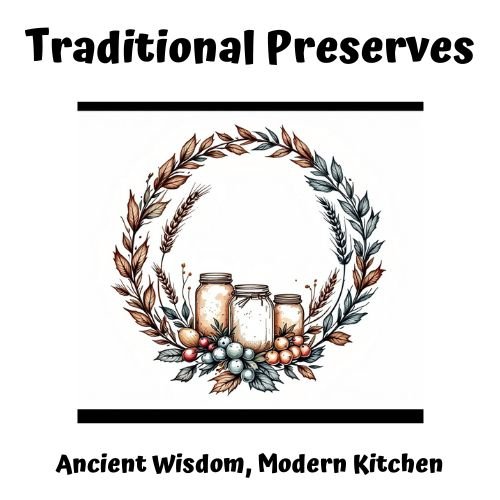
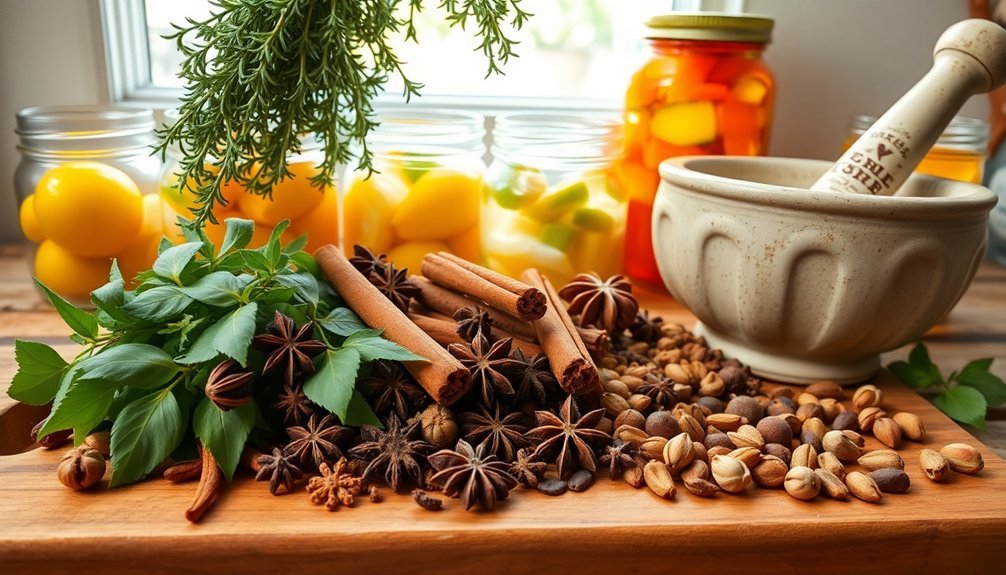
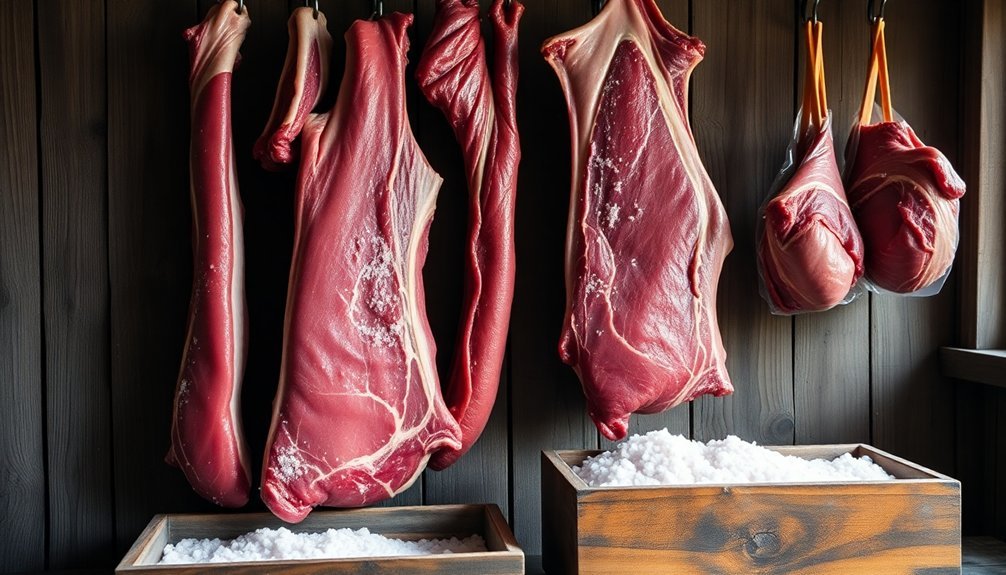
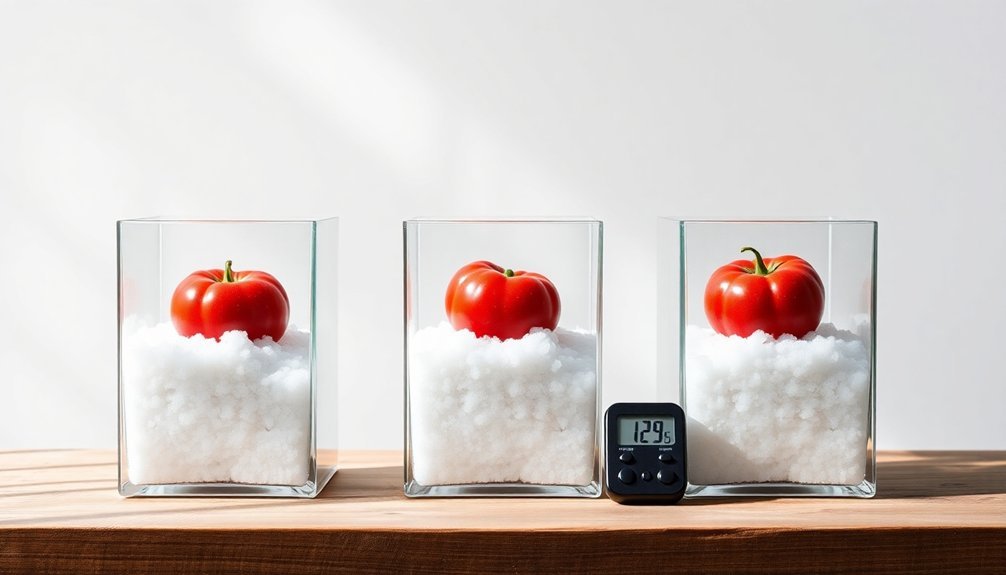
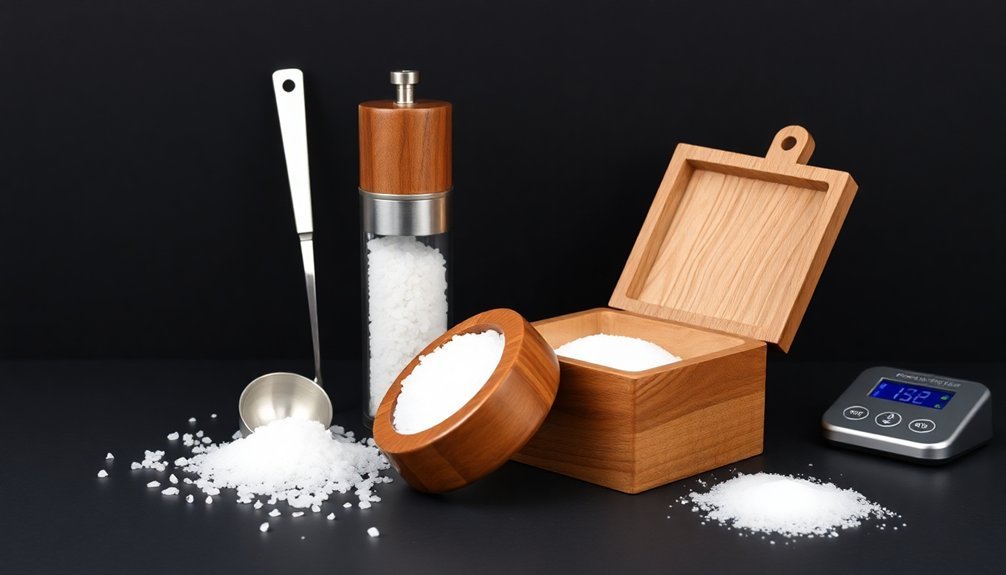
Leave a Reply